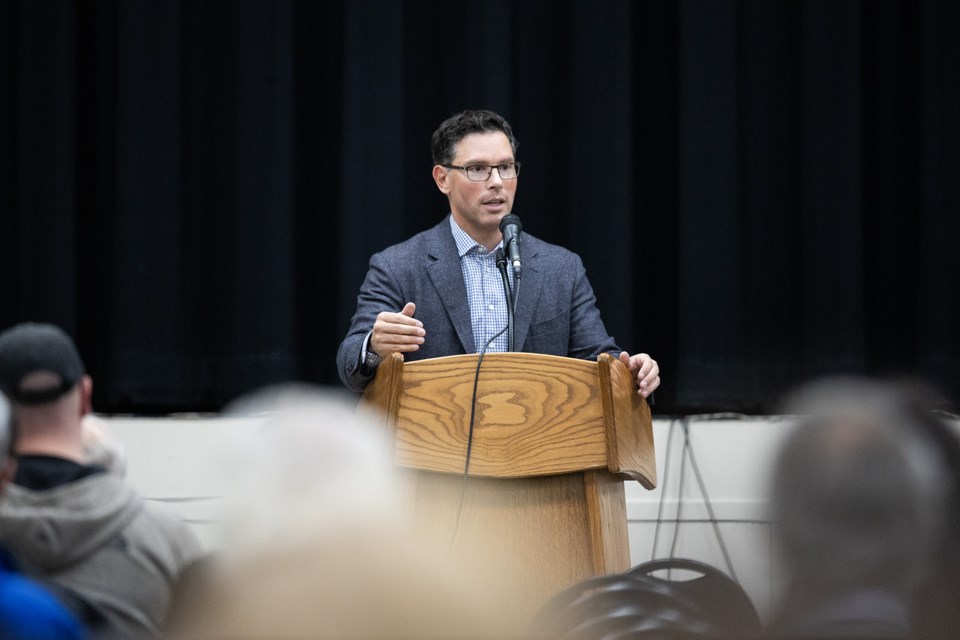Proposed changes by the provincial government could mean small towns in Rocky View County (RVC) may have to start paying for some of their own policing services, according to the New Democratic Party (NDP).
The opposition is claiming the governing United Conservative Party (UCP) is pitching for a change to the provincial cost model for policing that would see rural communities pay a percentage – between 15 and 70 per cent – of their frontline policing costs.
“That’s a pretty significant burden to suddenly download onto these municipalities,” said Kathleen Ganley, NDP MLA for Calgary-Mountain View. “In some areas, that will put people’s municipal tax burden up $400 a year, which is a lot of money to some people.”
The information is outlined in a Sept. 6 Alberta Government presentation, titled ‘Police Cost Model Review,’ to the Rural Municipalities of Alberta.
Under the current funding model, municipalities with populations between 5,000 and 15,000 people in Alberta pay for 70 per cent of their policing services, while the provincial government pays for the balance.
Meanwhile, the governing bodies of towns, villages, hamlets and municipal districts with populations smaller than 5,000 are exempt from paying for their community’s policing services. The cost is, instead, borne by the province at roughly $233 million a year, according to the NDP.
The NDP claims the UCP’s proposed funding changes would impact 291 small municipalities and communities in Alberta, which comprise roughly 20 per cent of the province’s population.
“What happens if one of these smaller municipalities decides their tax base can’t take it?” Ganley said. “If they have a bunch of seniors living there on a fixed income and they can’t afford to pay an extra $400 a year in their property taxes, then what happens? Will the province fund the back-fill, or will we see a shortage of police?”
During the 2018 provincial election, the UCP campaigned on tackling crime. Promises included funding ALERT to the tune of $50 million and hiring 50 additional prosecutors.
As a rebuttal the NDP’s claims, Justice Minister and Solicitor General Doug Schweitzer – who was recently on a province-wide tour of small towns in Alberta to listen to residents’ concerns about rural crime – released a statement Sept. 18 that claimed the UCP is investing more in policing, not less.
Schweitzer, the MLA for Calgary-Elbow, said the NDP’s assertions were hypocritical.
“After the NDP sat on their hands for four years as crime rates skyrocketed in many rural communities, Albertans gave the UCP a historic mandate to keep Albertans safe, secure and protected,” he said.
“Our government is committed to giving law enforcement the tools and resources necessary to ensure there is a sustainable reduction in crime, and Albertans have confidence that their justice system will protect them, their loved ones and their property.”
According to Schweitzer, the current funding model has resulted in a shortage of policing services, which is why the government is reviewing it.
“We’ve been listening to Albertans, municipalities and others, and are asking for feedback on a number of models on how police should be funded,” he said, adding if any new model would collect more money from municipalities, the funds would be re-invested in frontline policing.
“It would lead to more police funding, not less,” he said. “Any assertion to the contrary is absolutely, 100 per cent false.”
Many of the towns, hamlets and villages in Rocky View County (RVC) would be impacted by such changes.
Town of Crossfield Chief Administrative Officer Ken Bosman said the issue of how to fund policing in rural towns is not a new discussion. The local council – in a town that boasts a population of roughly 3,000 – has already begun preparing for the transition towards paying for the municipality’s own policing, he added.
“Under the current arrangement, we have designed our budget where we phase in policing expenditures to be ready for this transition when we hit 5,000 [people],” he said.
Bosman added the Town also employs an additional peace officer and is considering hiring more peace officers in the future, to account for population growth.
While Bosman claimed the Town is in “very good financial shape,” he added other municipalities are not, and having policing costs offloaded onto them could heavily impact their bottom line.
“I suspect assigning policing costs to the less financially well-off municipalities may be the difference between viability and non-viability,” he said.
“I suspect you’d see a number of the smaller towns in Alberta very likely dissolve due to financial insolvency, if the province were to impose this. That doesn’t apply to Crossfield, but that doesn’t make it a good idea to destroy smaller communities in rural Alberta.”



